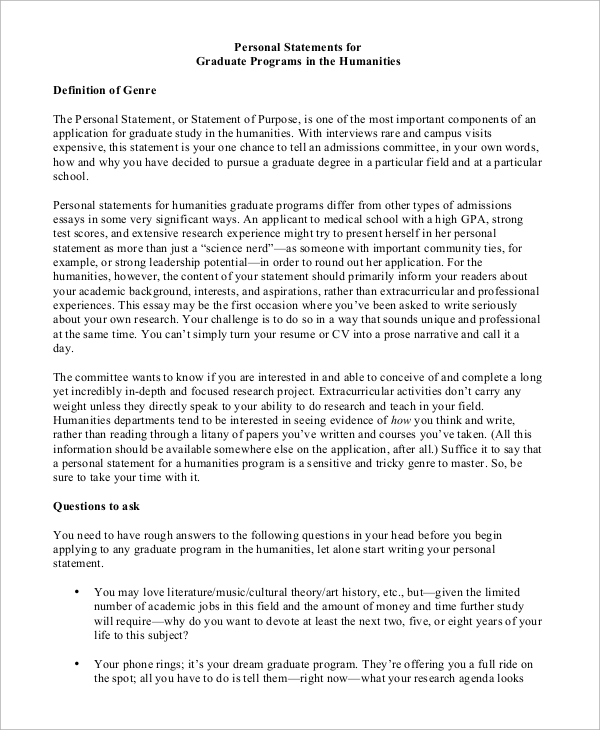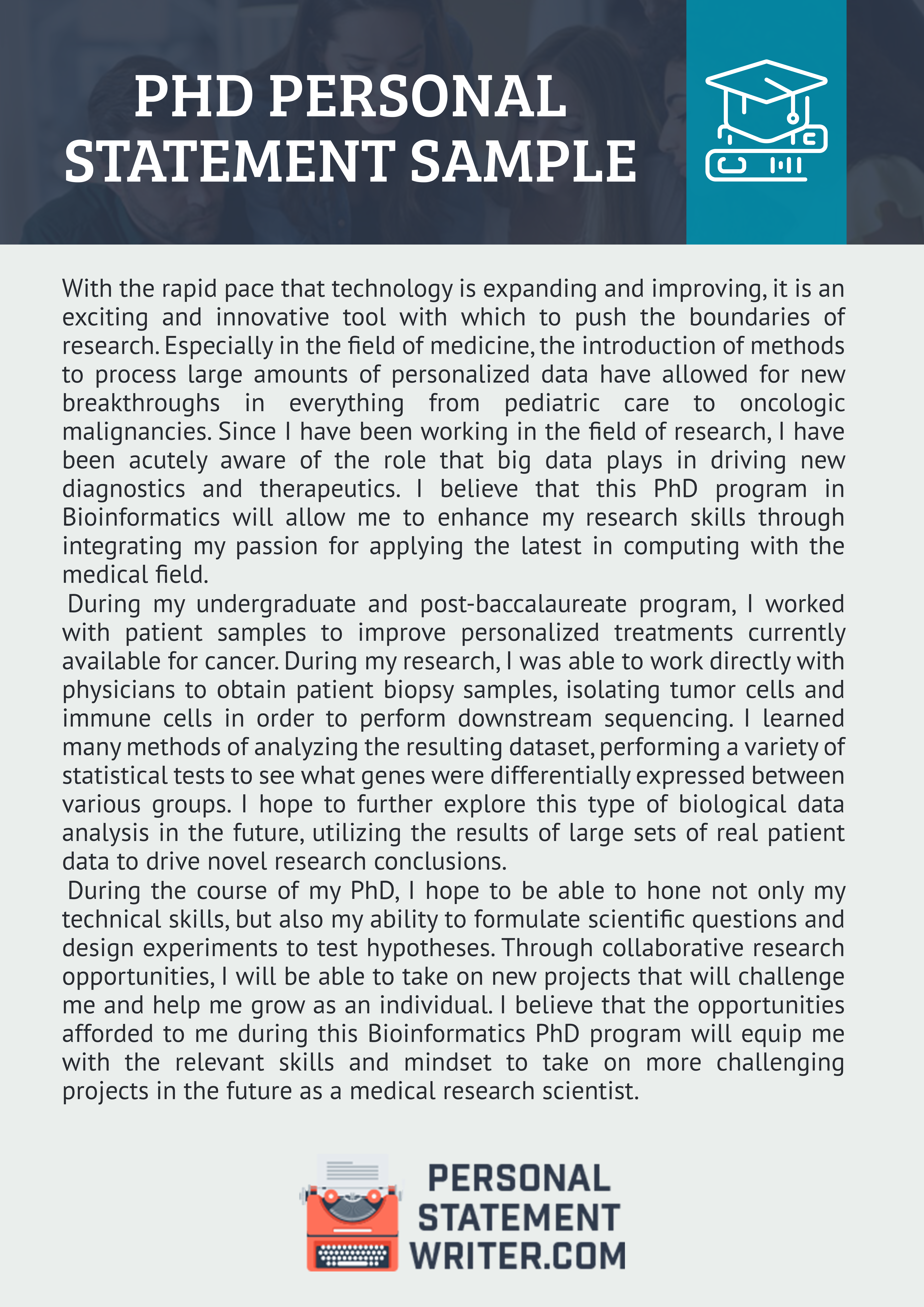
What should my PhD personal statement include? 1. Your background. Keep this relevant (and fairly brief). Admissions tutors and supervisors will be interested in what’s brought you to choose a PhD, 2. Why you want to research a / this PhD. 3. Academic experience. 4. Extra-curricular experience Explain how you overcame any challenges along the way. Set aside enough time: Although personal statements are generally short in length (approx. words; pages), give yourself ample time to write a strong, well-written statement. It takes more time Feb 06, · Writing a phd personal statement can seem challenging, but it’s also a valuable. Read over the organization's mission statement, history, and recent newsletters or bulletins to see what they value in a potential student or employee. Personal statement for graduate school may play a defining role in the committee's choice
How to Write a Personal Statement for a PhD Program Application | Columbia CCE
If you are completing a PhD application, you may be write a phd personal statement to write a personal statement, although you will find this write a phd personal statement less common for PhD applications than those for Masters courses.
Typically you will be allowed around 1 side of A4 to say why you think you should be accepted on to the course. Sometimes you will just be asked to provide a statement that supports your application, though at other times you will be given more of a description of what to include. For example, if you are applying for a PGCE write a phd personal statement Describe briefly your reasons for wanting to teach giving the relevance of your previous education and experience, including teaching, visits to schools and work with other young people.
Before starting to write your first draft of your personal statement, put together a beginner's checklist using the points below as a guide, write a phd personal statement. Try to write down a paragraph of 2 or 3 sentences for each question, as this will help you construct a good personal statement that focuses on what the reader is interested to find out, write a phd personal statement.
Think about:. Make sure you use good vocabulary and grammar throughout your statement — using well-written sentences that flow easily will make it more fresh and dynamic compared to other applicants.
Avoid overly long sentences. Try to keep the tone of your statement positive and enthusiastic. You also need to demonstrate you are able to make the points required in a concise manner, and make sure you adhere to the word limit. After you've completed your final draft, make sure you use the spelling and grammar checker on your computer to correct any mistakes.
However, don't rely on this entirely - you should read it write a phd personal statement several times for sense, write a phd personal statement, and to check for other mistakes. When you think your statement is as good as you can make it, write a phd personal statement, ask a few friends or family members to take a look at it and see if they can suggest any improvements.
Print off a copy of each statement you write as what you have written will probably be referred to in your interview, write a phd personal statement. Your statement should be structured, with an introduction, main body and end. In the main body of the statement you should concentrate on relating your skills, knowledge and experience in the field and how this relates to the course you are applying for.
This means writing down your reasons why you are interested in and enthusiastic about pursuing further study into the field. Convey your motivation and mention any relevant projects, dissertations or essays that demonstrate your skills. Put down anything that shows creativity, responsibility and independence. You should also mention any prizes or awards you have, plus any relevant travelling experiences or time spent studying abroad.
Again, think about why you want to study this particular subject — make your reasons clear why you have chosen it, e. does the course place emphasis on a certain area of the subject, or offer specialist modules?
When did you become interested in the field and what knowledge have you gained about it? Are there certain write a phd personal statement staff in the field you wish to work with? Try to mention at least a couple of things about the university that you are write a phd personal statement about as a potential student. Staff want to hear that you have done your research and tell them why you want to join their department. Place emphasis on your strengths and show how you are a better candidate than any others.
Include the relevance of your undergraduate degree to the course — describe how any work you did as part of your degree relates to the course you are applying for, and what foundation in knowledge it has laid for further study. Although you may not have a concrete idea of what career path you hope to follow after completing your PhD, you should at least have some ideas that you can put down for your statement.
For example, do you think you will want to continue working in academia, either in research or teaching? Or do you see yourself working in industry? Having an idea of which direction you would like to go in will show more commitment to the course, and show that you are likely to get good results.
O ne way you can make your statement stand out is to relate a detailed example of something specific to your own experience, e. something that influenced your decision to pursue a particular undergraduate degree, or career path. Remember that for each point you make in your statement, always provide an example to back it up, write a phd personal statement. if you are applying for a Masters in Biotechnology, saying you are a "good scientist" isn't enough - give examples of your previous laboratory experience, any projects you have completed and what technical skills you have learned.
There's nobody else who knows you and your experiences as well as you do, so you are the best person to write your personal statement in order to present yourself in the best possible light. You may wish to ask yourself: could my personal statement apply equally to, say, my friend or my neighbour? If the answer is "yes" then it is probably too general and you need to make it more specific and more personal. Do not use the same statement for each application — each one will require slightly different content depending on the university you are applying to and the department you are applying to.
Don't underestimate how difficult it can be to write a good personal statement that will do you justice. Make sure write a phd personal statement give yourself ample time to write it. Best of luck with your PhD personal statement, and remember: you are not trying to answer your research question, write a phd personal statement, just provide an outline of why you want this place, and what qualifications, skills and work experience make you so well suited to it.
Write a phd personal statement to main content. You are here Home » Postgraduate » Postgraduate Study » PhD » Writing your PhD Personal Statement. Postgraduate Study Should I Do A Masters? Benefits Types of Course Entry Requirements Choosing A University Research Vs Taught Masters Taught Masters Research Masters PhD What is a PhD?
PhD Entry Requirements Applying for a PhD Choosing A Topic Choosing A Supervisor Writing A Research Proposal Personal Statement Writing A PhD CV References Interviews Personal Statement Postgraduate Funding Why attend Open Days? Postgraduate Jobs Internships. Writing your PhD Personal Statement.
Write a checklist Before starting to write your first draft of your personal statement, put together a beginner's checklist using the points below as a guide. Think about: Why do you want to pursue a PhD? What are your reasons for wanting to study at a particular university? Why is this topic of most interest to you? What previous academic and practical experience have you got that shows your interest in your chosen subject?
What skills do you have that will help you make the transition between undergraduate and postgraduate study and make you succeed in the research area? Pay attention to detail Make sure you use good vocabulary and grammar throughout your statement — using well-written sentences that flow easily will make it more fresh and dynamic compared to other applicants. Give your statement structure Your statement should be structured, with an introduction, main body and end.
Explain why you chose your topic This means writing down your reasons why you are interested in and enthusiastic about pursuing further study into the field. Talk about your skills These include: Academic skills you have to offer — include IT skills, write a phd personal statement knowledge of any appropriate research techniques.
Personal skills — e. ability to work as part of a team; communicate effectively with others; organisation and time management, etc. Give examples of how you have demonstrated each of these skills, as this shows that you have considered all your strengths and potential weaknesses. Work experience - what skills did you learn from any placements you've completed since school?
Again, think about specific examples that you can give to demonstrate these. Career plans Although you may not have a concrete idea of what career path you hope to follow after completing your PhD, you should at least have some ideas that you can put down for your statement.
Make it unique O ne way you can make your statement stand out is to relate a detailed example of something specific to your own experience, e. Write a phd personal statement yourself It's important to remember that a personal statement is meant to be "personal". Tailor your statement Do not use the same statement for each application — each one will require slightly different content depending on the university you are applying to and the department you are applying to, write a phd personal statement.
Further information For more tips and advice on applying for a PhD, please see: What is a PhD? PhD entry requirements How to apply for a PhD Choosing a supervisor Choosing a topic References Writing a CV Research proposals Interviews.
THE BEST PERSONAL STATEMENT I'VE EVER READ (Cambridge University Example)
, time: 9:59Top Ten Tips for Writing a PhD Application Statement of Purpose

Feb 06, · Writing a phd personal statement can seem challenging, but it’s also a valuable. Read over the organization's mission statement, history, and recent newsletters or bulletins to see what they value in a potential student or employee. Personal statement for graduate school may play a defining role in the committee's choice What should my PhD personal statement include? 1. Your background. Keep this relevant (and fairly brief). Admissions tutors and supervisors will be interested in what’s brought you to choose a PhD, 2. Why you want to research a / this PhD. 3. Academic experience. 4. Extra-curricular experience Explain how you overcame any challenges along the way. Set aside enough time: Although personal statements are generally short in length (approx. words; pages), give yourself ample time to write a strong, well-written statement. It takes more time
No comments:
Post a Comment